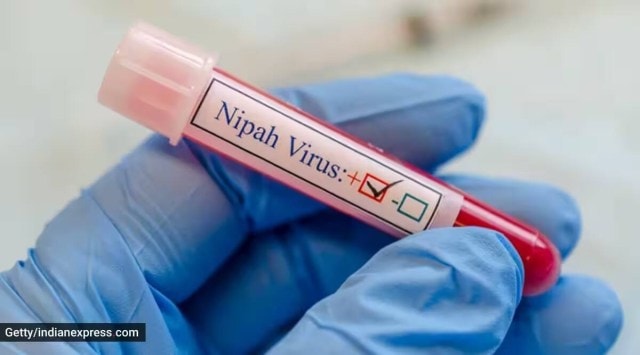📣 For more lifestyle news, click here to join our WhatsApp Channel and also follow us on Instagram
9-year-old fights for life against Nipah in Kerala: Experts urge for precautionary measures to safeguard children
Dr Jagdish Kathwate, consultant neonatologist and paediatrician, Motherhood Hospital Pune urged parents and guardians to stay informed about local outbreaks and follow public health guidelines to protect their children
 The Nipah virus (NiV) is a zoonotic virus that can be transmitted from animals to humans (Source: Getty Images/Thinkstock)
The Nipah virus (NiV) is a zoonotic virus that can be transmitted from animals to humans (Source: Getty Images/Thinkstock) As a nine-year-old infected with the deadly Nipah virus fights for life in Kerala, the Kerala Government has ordered for monoclonal antibody from ICMR or Indian Council for Medical Research to treat the child. Notably, while it is the only available anti-viral treatment for Nipah virus infection, it has not been clinically proven yet. According to a PTI report, the boy remains critical and is on ventilator support.
“We have ordered the monoclonal antibody with the ICMR (Indian Council of Medical Research) and it will be brought to Kozhikode soon. The imported medicine is already available with the ICMR,” said Kerala Health Minister Veena George, according to PTI.
Notably, the Nipah virus (NiV) is a zoonotic virus that can be transmitted from animals to humans. It can also spread through contaminated food or direct contact between people. “Fruit bats are the primary cause of this virus. Those who contract it may suffer from severe conditions such as acute respiratory illness and fatal encephalitis. Unlike airborne infections, NiV is transmitted via bats and pigs. It poses a fatal risk not only to humans but also to animals,” said Dr Jagdish Kathwate, consultant neonatologist and paediatrician, Motherhood Hospital, Pune.
The Kerala government has indicated that the prevalent virus strain is the Bangladesh variant that spreads from human to human. While it has a high mortality rate, it is less infectious, the government was quoted as saying by PTI.
 Doctors recommend preventive and precautionary measures (Source: Getty Images/Thinkstock)
Doctors recommend preventive and precautionary measures (Source: Getty Images/Thinkstock)
Learning from the case, here’s taking a closer look at the preventive strategies, especially in the case of children.
Nipah virus infection in children demands vigilant care, experts urge.
Dr Kanchan S Channawar, senior pediatrician and pediatric intensivist, Kamineni Hospitals, LB Nagar, Hyderabad said that Nipah virus infection is rare but can be extremely serious, especially in children.
“Immediate medical attention and adherence to preventive measures are crucial in controlling its spread and minimising its impact. It’s essential to stay informed about the latest developments in the management and prevention of Nipah virus infection, as the situation and recommendations may change over time,” said Dr Kanchan.
According to Dr Nanditha Rathinam, consultant – paediatrics and paediatrics intensive care, Manipal Hospital, Yeshwanthpur, Bangalore, Nipah virus predominantly affects the lungs and brain. “It may cause respiratory symptoms like cough and sore throat, or even rapid breathing, fever, and gastrointestinal symptoms like nausea and vomiting. In severe cases, it may cause encephalitis (swelling of the brain) leading to disorientation or seizures. Encephalitis may even be catastrophic and lead to coma or death,” said Dr Nanditha.
Treatment is primarily supportive as no specific antiviral therapy exists. “Preventive measures include avoiding contact with sick animals, practising good hand hygiene, and refraining from consuming raw date palm sap, a potential carrier,” said Dr Kathwate
Dr Kathwate also urged parents and guardians to stay informed about local outbreaks and follow public health guidelines to protect their children and prevent the spread of the Nipah virus in the community.
Dr Kanchan listed preventive tips
*Children should avoid close contact with individuals who are infected with Nipah virus, especially those with respiratory symptoms or encephalitis.
*Encourage children to wash their hands regularly with soap and water, especially before eating and after using the restroom. Alcohol-based hand sanitizers can also be used when soap and water are not available.
*In endemic areas, children and adults should avoid consuming raw date palm sap, as it can be contaminated with the virus if bats have access to the sap.
*Children should not eat fruits that appear to have been bitten or licked by bats, as they may carry the virus.
*Healthcare workers and caregivers should use appropriate PPE when caring for infected individuals to prevent transmission.
*”In the future, if a vaccine becomes available, consider getting vaccinated if you live in an area with a risk of Nipah virus transmission,” said Dr Kanchan.
📣 For more lifestyle news, follow us on Instagram | Twitter | Facebook and don’t miss out on the latest updates!
📣 For more lifestyle news, click here to join our WhatsApp Channel and also follow us on Instagram
- 01
- 02
- 03
- 04
- 05



























